[center][large]The Story of Civilization[/large][/center]
[---]
[justify]The Story of Civilization, by husband and wife Will and Ariel Durant, is an eleven-volume set of books covering Western history for the general reader. The volumes sold well for many years, and sets of them were frequently offered by book clubs.
The series was written over a span of more than four decades, and it totals four million words across nearly 10,000 pages, but is incomplete. In the first volume (Our Oriental Heritage, which covers the history of the East through 1933), Will Durant stated that he wanted to include the history of the West through the early 20th century. However, the series ends with The Age of Napoleon because the Durants both died in the 1980s ? she in her 80s and he in his 90s ? before they could complete additional volumes.
The first six volumes of The Story of Civilization are credited to Will Durant, with Ariel receiving recognition in the acknowledgements. In later volumes, beginning with The Age of Reason Begins, Ariel is credited as a co-author.[/justify]
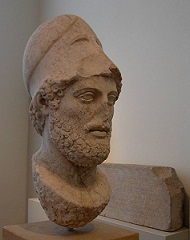
* Volume 1 : Our Oriental Heritage
* Volume 2 : The Life of Greece
* Volume 3 : Caesar and Christ
* Volume 4 : The Age of Faith
* Volume 5 : The Renaissance
* Volume 6 : The Reformation
* Volume 7 : The Age of Reason Begins
* Volume 8 : The Age of Louis XIV
* Volume 9 : The Age of Voltaire
* Volume 10 : Rousseau and Revolution
* Volume 11 : Age of Napoleon
[justify]The Story of Civilization has been criticized by some for simplifications, rash judgments colored by personal convictions, and story-telling, and described as a careless dabbling in historical scholarship.
The counter to such criticism is that Durant?s purpose in writing the series was not to create a definitive scholarly production but to make a large amount of information accessible and comprehensible to the educated public in the form of a comprehensive "composite history." Given the massive undertaking in creating these 11 volumes over 50 years, errors and incompleteness have occurred; yet for an attempt as large in breadth of time and scope as this, there are no similar works to compare.
As Durant says in the preface to his first work, Our Oriental Heritage:
I wish to tell as much as I can, in as little space as I can, of the contributions that genius and labor have made to the cultural heritage of mankind ? to chronicle and contemplate, in their causes, character and effects, the advances of invention, the varieties of economic organization, the experiments in government, the aspirations of religion, the mutations of morals and manners, the masterpieces of literature, the development of science, the wisdom of philosophy, and the achievements of art. I do not need to be told how absurd this enterprise is, nor how immodest is its very conception ? Nevertheless I have dreamed that despite the many errors inevitable in this undertaking, it may be of some use to those upon whom the passion for philosophy has laid the compulsion to try to see things whole, to pursue perspective, unity and time, as well as to seek them through science in space. ? Like philosophy, such a venture (as the creation of these 11 volumes) has no rational excuse, and is at best but a brave stupidity; but let us hope that, like philosophy, it will always lure some rash spirits into its fatal depths.
?Will Durant, Our Oriental Heritage, preface
[small]* The Lessons of History companion volume to Story of Civilization set.[/small][/justify]
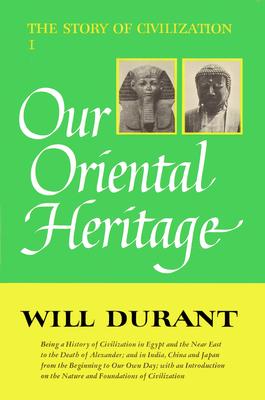 [justify]Many years ago, before the days of The Story of Philosophy, Will Durant planned to write a history of the 19th century. He started to work on it only to find that his subject could be understood only in terms of what had come before. His researches gradually led him into the formation of a plan for writing a history of all civilization, ancient and modern, Occidental and Oriental. His enthusiasm was further spurred by two trips around the world and particularly by an intensive study of the history of the Far East.
[justify]Many years ago, before the days of The Story of Philosophy, Will Durant planned to write a history of the 19th century. He started to work on it only to find that his subject could be understood only in terms of what had come before. His researches gradually led him into the formation of a plan for writing a history of all civilization, ancient and modern, Occidental and Oriental. His enthusiasm was further spurred by two trips around the world and particularly by an intensive study of the history of the Far East.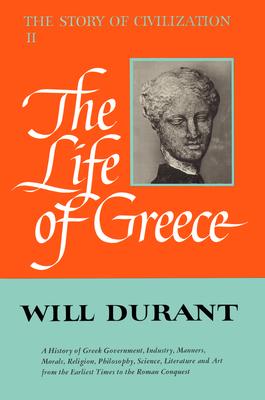 [justify]In the course of his dynamic synthesis of world history, Will Durant now attacks the absorbing, perennially fascinating problem of Greek civilization. Not since Mahaffy's eight epochal volumes, almost half a century ago, has a historian grappled so boldly with the whole complicated structure of that civilization which has laid its spell on every enlightened generation of thinkers and dreamers.
[justify]In the course of his dynamic synthesis of world history, Will Durant now attacks the absorbing, perennially fascinating problem of Greek civilization. Not since Mahaffy's eight epochal volumes, almost half a century ago, has a historian grappled so boldly with the whole complicated structure of that civilization which has laid its spell on every enlightened generation of thinkers and dreamers. [justify]In this massive book, whose scope and wit recall the golden days of historical writing, Dr. Durant recounts the flaming pageant of the rise of Rome from a crossroads town to world mastery. He tells of its achievements through two centuries of security and peace, from the Crimea to Gibraltar and from the Euphrates to Hadrian's Wall, of its spread of classic civilization over the Mediterranean and western European world. He tells of Rome's struggle to preserve its ordered realm from a surrounding sea of barbarism and of its long, slow crumbling and final catastrophic collapse into darkness and chaos.
[justify]In this massive book, whose scope and wit recall the golden days of historical writing, Dr. Durant recounts the flaming pageant of the rise of Rome from a crossroads town to world mastery. He tells of its achievements through two centuries of security and peace, from the Crimea to Gibraltar and from the Euphrates to Hadrian's Wall, of its spread of classic civilization over the Mediterranean and western European world. He tells of Rome's struggle to preserve its ordered realm from a surrounding sea of barbarism and of its long, slow crumbling and final catastrophic collapse into darkness and chaos.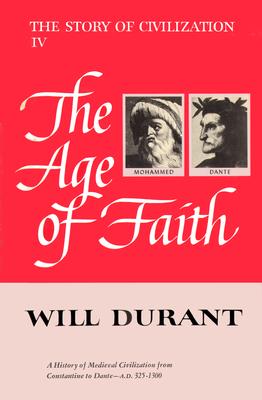 [justify]THE AGE OF FAITH surveys the medieval achievements and modern significance of Christian, Islamic, and Judaic life and culture from Constantine to Dante ? from 325 to 1300 A.D. Like the other volumes in The Story of Civilization series, this is an independent and self-contained work, which at the same time fits into the total plan of a comprehensive history of mankind. It includes the dramatic stories of St. Augustine, Hypatia, Justinian, Mohammed, Harun-al-Rashid, Omar Khayyam, Charlemagne, William the Conqueror, Eleanor of Aquitaine, Richard the Lion-Hearted, Saladin, Maimonides, St. Francis, St. Thomas Aquinas, Roger Bacon, and many others, til in the full perspective of integrated history. The greatest love stories in literature ? of Héoise and Abélard, of Dante and Beatrice ? are here retold with enthralling scholarship.
[justify]THE AGE OF FAITH surveys the medieval achievements and modern significance of Christian, Islamic, and Judaic life and culture from Constantine to Dante ? from 325 to 1300 A.D. Like the other volumes in The Story of Civilization series, this is an independent and self-contained work, which at the same time fits into the total plan of a comprehensive history of mankind. It includes the dramatic stories of St. Augustine, Hypatia, Justinian, Mohammed, Harun-al-Rashid, Omar Khayyam, Charlemagne, William the Conqueror, Eleanor of Aquitaine, Richard the Lion-Hearted, Saladin, Maimonides, St. Francis, St. Thomas Aquinas, Roger Bacon, and many others, til in the full perspective of integrated history. The greatest love stories in literature ? of Héoise and Abélard, of Dante and Beatrice ? are here retold with enthralling scholarship.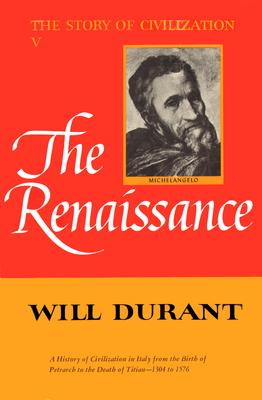 [justify]Almost thirty years ago Dr. Will Durant won wide and spectacular popularity overnight with his history of philosophy. Now, as he reaches the fifth volume of his monumental seven-part "Story of Civilization," he is slowly and solidly achieving world fame through his Philosophy of History. For in this new book Will Durant applies his "integral method" to the fascinating and exuberant Italy of the Renaissance, from the birth of Petrarch in 1304 to the death of Titian in 1576.
[justify]Almost thirty years ago Dr. Will Durant won wide and spectacular popularity overnight with his history of philosophy. Now, as he reaches the fifth volume of his monumental seven-part "Story of Civilization," he is slowly and solidly achieving world fame through his Philosophy of History. For in this new book Will Durant applies his "integral method" to the fascinating and exuberant Italy of the Renaissance, from the birth of Petrarch in 1304 to the death of Titian in 1576.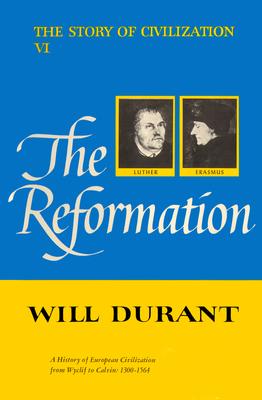 [justify]In this new book Will Durant surveys the men and the ideas, the beliefs and the world-shaking conflicts of the Age of the Reformation. It is both a self-contained and independent study of the Reformation?perhaps the most important event in modern history?and at the same time a continuation of Durant's monumental work of history, "The Story of Civilization."
[justify]In this new book Will Durant surveys the men and the ideas, the beliefs and the world-shaking conflicts of the Age of the Reformation. It is both a self-contained and independent study of the Reformation?perhaps the most important event in modern history?and at the same time a continuation of Durant's monumental work of history, "The Story of Civilization."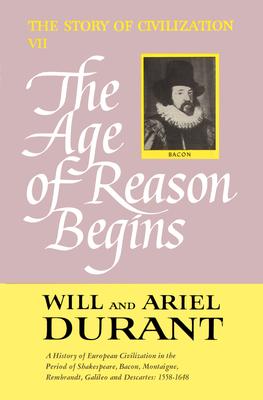 [justify]This book continues the life work of what may now be called the Durant family in writing the history of civilization. The six volumes previously published (listed on the back of this jacket) carried the story of mankind from the earliest beginnings of Asiatic civilization to the death of Calvin in 1564. Volume VII, The Age of Reason Begins, surveys the turbulent century of religious strife and scientific progress from the accession of Elizabeth I of England in 1558 to the death of Descartes in 1650 ?a century marked by such great names as Bacon, Shakespeare, Galileo, and Rembrandt.
[justify]This book continues the life work of what may now be called the Durant family in writing the history of civilization. The six volumes previously published (listed on the back of this jacket) carried the story of mankind from the earliest beginnings of Asiatic civilization to the death of Calvin in 1564. Volume VII, The Age of Reason Begins, surveys the turbulent century of religious strife and scientific progress from the accession of Elizabeth I of England in 1558 to the death of Descartes in 1650 ?a century marked by such great names as Bacon, Shakespeare, Galileo, and Rembrandt.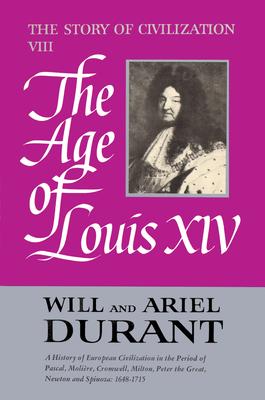 [justify]In 1926 Will Durant achieved world-wide renown by his now classic Story of Philosophy. Thirty-seven years and two million copies later, he and his wife have won still greater acclaim by their Story of Civilization? the series on which they have labored together since 1921 and which has been published in ten languages. They have applied philosophy to history by their "integral method" of seeing each period in "total perspective" (which is their definition of philosophy): i.e., presenting in one integrated narrative all the facets of an age ? government, economy, religion, morals, manners, literature, art, music, science, and philosophy.
[justify]In 1926 Will Durant achieved world-wide renown by his now classic Story of Philosophy. Thirty-seven years and two million copies later, he and his wife have won still greater acclaim by their Story of Civilization? the series on which they have labored together since 1921 and which has been published in ten languages. They have applied philosophy to history by their "integral method" of seeing each period in "total perspective" (which is their definition of philosophy): i.e., presenting in one integrated narrative all the facets of an age ? government, economy, religion, morals, manners, literature, art, music, science, and philosophy.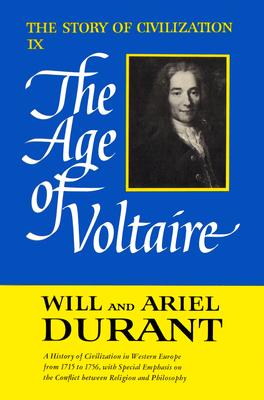 [justify]The Age of Voltaire is the penultimate volume in the monumental Durant series chronicling The Story of Civilization, representing almost fifty years of dedicated research, exacting scholarship and creative and inspiring authorship. It is by far the best known, most popular and most comprehensive history of mankind now available, forming a vast panoramic picture of civilization, from the earliest days to the French Revolution. The nine volumes already published, now available in ten languages, have won the authors international acclaim and have become "basic books" in millions of homes the world over, constituting the foundation of a liberal education. It is not just the clarity, the "wisdom winged with wit" of their writing, their brilliant mastery of complex fact, that have won the Durants so great a global readership; it is, above all, their method?for it is the aim of Dr. and Mrs. Durant to present each period of history in total perspective, giving the reader an integrated and unified narrative of all the facets of a given age or culture ? including government, economy, religion, morals, manners, literature, art, music, science and philosophy. Their history is not a chronicle of battles, dates, kings and events, though these have their places in it; it is a record of man's great achievements, failures and hopes, in short, the whole vast heritage of countless generations and cultures which we call civilization.
[justify]The Age of Voltaire is the penultimate volume in the monumental Durant series chronicling The Story of Civilization, representing almost fifty years of dedicated research, exacting scholarship and creative and inspiring authorship. It is by far the best known, most popular and most comprehensive history of mankind now available, forming a vast panoramic picture of civilization, from the earliest days to the French Revolution. The nine volumes already published, now available in ten languages, have won the authors international acclaim and have become "basic books" in millions of homes the world over, constituting the foundation of a liberal education. It is not just the clarity, the "wisdom winged with wit" of their writing, their brilliant mastery of complex fact, that have won the Durants so great a global readership; it is, above all, their method?for it is the aim of Dr. and Mrs. Durant to present each period of history in total perspective, giving the reader an integrated and unified narrative of all the facets of a given age or culture ? including government, economy, religion, morals, manners, literature, art, music, science and philosophy. Their history is not a chronicle of battles, dates, kings and events, though these have their places in it; it is a record of man's great achievements, failures and hopes, in short, the whole vast heritage of countless generations and cultures which we call civilization.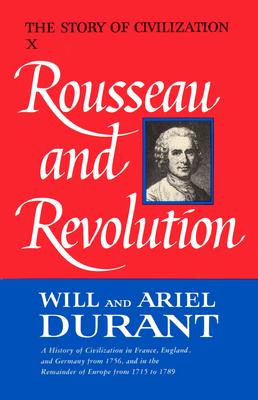 [justify]The publication of Rousseau and Revolution is more than a cause for pleasure for the hundreds of thousands of readers of The Story of Civilization. It is a major event, for it marks the conclusion of a lifetime's work and the completion of what is certainly the most ambitious, widely read and best-known work of history in our time. With this volume Will and Ariel Durant bring to a splendid finale their "magnificent and monumental" ten-volume chronicle ? over four decades in work ? of our cultural, political, philosophical, religious and social heritage, from its roots in ancient Oriental and Greek society to the shaping of the modern world.
[justify]The publication of Rousseau and Revolution is more than a cause for pleasure for the hundreds of thousands of readers of The Story of Civilization. It is a major event, for it marks the conclusion of a lifetime's work and the completion of what is certainly the most ambitious, widely read and best-known work of history in our time. With this volume Will and Ariel Durant bring to a splendid finale their "magnificent and monumental" ten-volume chronicle ? over four decades in work ? of our cultural, political, philosophical, religious and social heritage, from its roots in ancient Oriental and Greek society to the shaping of the modern world.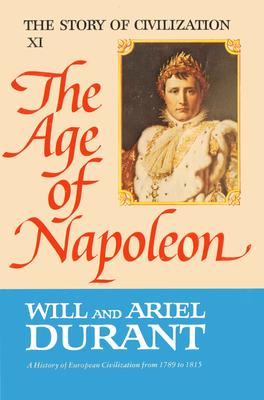 [justify]IN THIS triumphant and massive work, perhaps the finest to date in the long careers of Will and Ariel Durant, whose multivolumed Story of Civilization has reached hundreds of thousands of readers and established itself as one of the greatest and most enduring classics of history, the central figure is Napoleon, the archetypal hero, whose restless, ambitious and intelligent mind dominated his age and has never ceased to fascinate the world he helped to fashion in the course of his ambitions. To his enigmatic character and incredible career the Durants have brought the full range of their genius and skill? never has the Emperor been portrayed more fully, never have his gifts, faults, complexities and achievements been so brilliantly illuminated or so intimately described.
[justify]IN THIS triumphant and massive work, perhaps the finest to date in the long careers of Will and Ariel Durant, whose multivolumed Story of Civilization has reached hundreds of thousands of readers and established itself as one of the greatest and most enduring classics of history, the central figure is Napoleon, the archetypal hero, whose restless, ambitious and intelligent mind dominated his age and has never ceased to fascinate the world he helped to fashion in the course of his ambitions. To his enigmatic character and incredible career the Durants have brought the full range of their genius and skill? never has the Emperor been portrayed more fully, never have his gifts, faults, complexities and achievements been so brilliantly illuminated or so intimately described.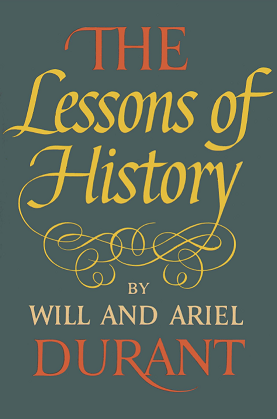 [justify]In this illuminating and thoughtful book, Will and Ariel Durant have succeeded in distilling for the reader the accumulated store of knowledge and experience from their four decades of work on the ten monumental volumes of The Story of Civilization. The result is a survey of human history, full of dazzling insights into the nature of human experience, the evolution of civilization, the culture of man. With the completion of their life's work they look back and ask what history has to say about the nature, the conduct and the prospects of man, seeking in the great lives, the great ideas, the great events of the past for the meaning of man's long journey through war, conquest and creation?and for the great themes that can help us to understand our own era.
[justify]In this illuminating and thoughtful book, Will and Ariel Durant have succeeded in distilling for the reader the accumulated store of knowledge and experience from their four decades of work on the ten monumental volumes of The Story of Civilization. The result is a survey of human history, full of dazzling insights into the nature of human experience, the evolution of civilization, the culture of man. With the completion of their life's work they look back and ask what history has to say about the nature, the conduct and the prospects of man, seeking in the great lives, the great ideas, the great events of the past for the meaning of man's long journey through war, conquest and creation?and for the great themes that can help us to understand our own era.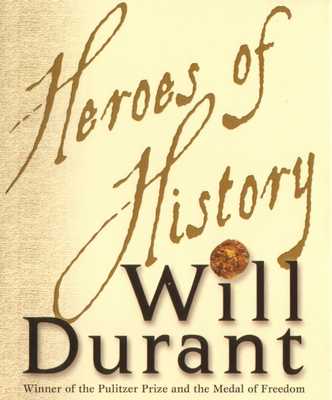 [justify]A Brief History of Civilization front Ancient Times to the Dawn of the Modern Age
[justify]A Brief History of Civilization front Ancient Times to the Dawn of the Modern Age